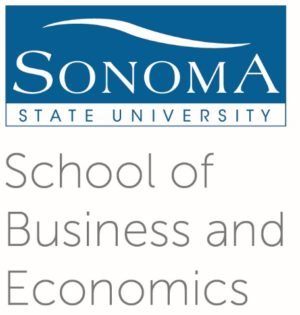 ROHNERT PARK, CA. (June 21, 2022) – Selected by the Board of Trustees of the California State University Ron Rubin, an industry beverage authority received an honorary degree of Doctorate of Humane Letters at Sonoma State University (SSU) School of Business and Economics (SBE) commencement ceremony May 21st. CSU and SSU held Ron Rubin’s career up as a model for the class of 2022, noting more than four decades of visionary contributions as a businessman who has built and led three beverage and wine companies worldwide, given back to the community as a philanthropist, and has been dedicated to the world-class success of the Wine Business Institute (WBI).
ROHNERT PARK, CA. (June 21, 2022) – Selected by the Board of Trustees of the California State University Ron Rubin, an industry beverage authority received an honorary degree of Doctorate of Humane Letters at Sonoma State University (SSU) School of Business and Economics (SBE) commencement ceremony May 21st. CSU and SSU held Ron Rubin’s career up as a model for the class of 2022, noting more than four decades of visionary contributions as a businessman who has built and led three beverage and wine companies worldwide, given back to the community as a philanthropist, and has been dedicated to the world-class success of the Wine Business Institute (WBI).
“Ron Rubin’s leadership and dedication to the community embody the values of the California State University system which strives to instill in our students: to live inquiring, ethical and productive lives as global citizens,” said Dean Coget, recognizing Ron Rubin’s commitment to serving social good through innovative services and education programs.
“His storied career advancing the business of beverage and his generous philanthropy, make him a true exemplar of the California State University spirit,” noted Ray Johnson, Executive Director of the WBI. “On a personal note, Ron has been a mentor to me throughout my tenure at the Wine Business Institute. I benefit from his wisdom and guidance regularly.”
Philanthropy plays a major role in Ron Rubin’s general make-up. He is the current President of the Board of Directors for Sonoma State University’s Wine Business Institute, advising on the University’s curriculum. He was a major donor of the Wine Spectator Learning Center’s state-of-the-art education complex, and home of the WBI and over 1600 wine industry graduates. In recent years, he has also been honored by North Bay Business Journal, with their Innovator of the Year Award.
He began the Ron Rubin Winery TRAINED FOR “SAVING LIVES” program. In collaboration with the American Red Cross and ZOLL Medical Corporation, Ron Rubin Winery is covering the cost of one ZOLL AED PLUS (Automated External Defibrillator) unit, to 450 qualifying, California wineries. This sustainability and safety plan is designed to keep visitors to California’s wine country safe, in the event a defibrillator is needed at any of the program’s participating wineries. Each day, California becomes more heart safe, in the possible event that CPR or an AED would be necessary. There are currently 283 wineries participating in the program’ and are now TRAINED FOR “SAVING LIVES,” with over 1600 newly trained staff members ready to take action, if and when necessary.
Mr. Rubin was nominated for this degree by Sonoma State in recognition of his leadership to Sonoma County and his advocacy, advice and support for the university.
About the Wine Business Institute
The Wine Business Institute (WBI) serves as an intellectual and industry center for faculty, students, and the business community. Founded in 1996 as a partnership between the wine industry leaders and the School of Business and Economics at Sonoma State University, the WBI provides cutting-edge research that informs industry best practices and program curriculum. For more information about degree and certificate programs or wine business research https://sbe.sonoma.edu/winebiz.
About Sonoma State University School of Business and Economics
The SBE is a leading institution of business education in the San Francisco Bay Area, with an emphasis on preparing students to succeed in an economy that is global in nature. Our commitment to sustainable business, diversity, social justice, and global partnerships echoes our core philosophy of purpose-driven leadership. As one of the 50 top-ranked public universities, we have been recognized worldwide for our investments in diversity, social responsibility, and visionary academics. Many classes average fewer than 40 students, allowing close interaction between students and faculty.


















